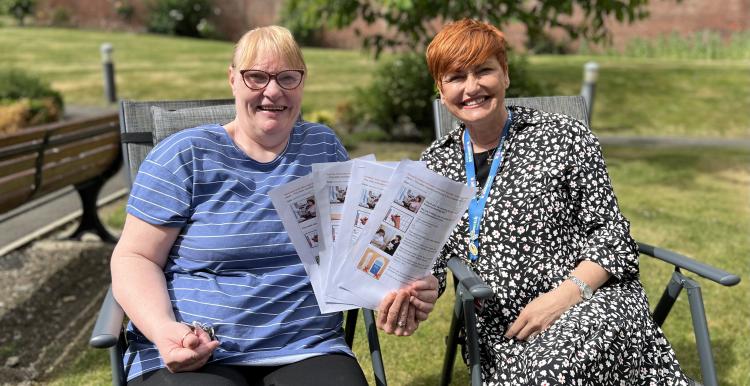Self advocacy success as breast screening recall letters available in easy-read nationwide

Sunderland People First
Sharon Bell is a founding member of Sunderland People First, a self-advocacy group that supports people with learning disabilities or autism. The group has been campaigning for the rights of people with learning disabilities since 1994, and Healthwatch Sunderland works very closely with them.
During a “Learn and Share” engagement session, Sharon shared her experience of local breast screening services and Queen Elizabeth Hospital with Healthwatch Sunderland.
While the initial breast screening invite had been issued in an easy-read format, Sharon was frustrated that a follow-up letter wasn’t. She explained that her confidence and empowerment in receiving that initial invite were taken away, along with her independence, as she had to rely on her sister to explain the letter to her.
People need easy-read information at the start to understand what is involved. This can help you feel confident to ask any questions and think about what would make your screening appointment easier.
Accessible information matters
Healthwatch Sunderland reached out to Queen Elizabeth Hospital as part of their investigation to determine if Sharon had been issued the wrong recall letter. They found that a recall letter didn’t exist in easy-read.
Sadly, Sharon's case is not an isolated one. People not receiving information in formats they can understand is a recurring issue that has been reported across the country, despite the introduction of the Accessible Information Standard in 2016.
The Accessible Information Standard ensures people with disabilities receive information and communications in formats that work for them. This is particularly important when it comes to health and social care.
While initial invites to breast screening appointments were available in an easy-read format, subsequent communications weren’t. This meant that women who relied on an easy-read format to understand information and updates about their health would be left in the dark, confused, or reliant on someone else to tell them what a recall letter meant and what was required of them.

Self-advocacy in action
Working with Sharon, Healthwatch Sunderland reached out to Public Health England and later NHS England and NHS Improvement to address this barrier to access.
NHS England and NHS Improvement confirmed that they could generate recall letters in easy-read, and work to do so was in progress.
But it was during an online call with NHS England, facilitated by Healthwatch Sunderland, Sharon had the opportunity to share her story with NHS decision-makers, which made all the difference.
Healthwatch Sunderland credits Sharon as the driving force behind the implementation of additional easy-read letters for women who are recalled to hospital after a mammogram.
In advocating for her healthcare, Sharon’s powerful story has improved access for women all over England who rely on easy-read for written information concerning their health.
Improving access to healthcare
Thanks for Sharon sharing her story and speaking up about her experience Healthwatch Sunderland became aware that this barrier to access existed and were able to work to remove it.
Sharon’s self-advocacy through Sunderland People First has made a difference for women with learning disabilities across England, improving access to information about breast screening services and what is involved in a recall appointment.
Motivated by Sharon’s story, Healthwatch Sunderland worked in partnership with Public Health England and NHS England to deliver improved access to breast screening information for women who require easy-read communications.
While it took two years for them to come into effect, easy-read breast screening recall letters are now available for all patients in England who require them thanks to Sharon’s self-advocacy and Healthwatch Sunderland championing her voice.
This is a brilliant example of a Healthwatch achieving real change that will benefit its local community and women across England.
Led by Sharon’s experience, the collaborative work between Healthwatch Sunderland, Public Health England and NHS England to address this accessibility of breast screening recall information illustrates what can be achieved when organisations come together to improve healthcare access for seldom-heard voices.
Self-advocates from Sunderland People First have developed brilliant relationships with the team at Healthwatch Sunderland. We know that amazing things happen when we work together in partnership. We would encourage Healthwatch teams across the country to link up with their local self-advocacy group.

